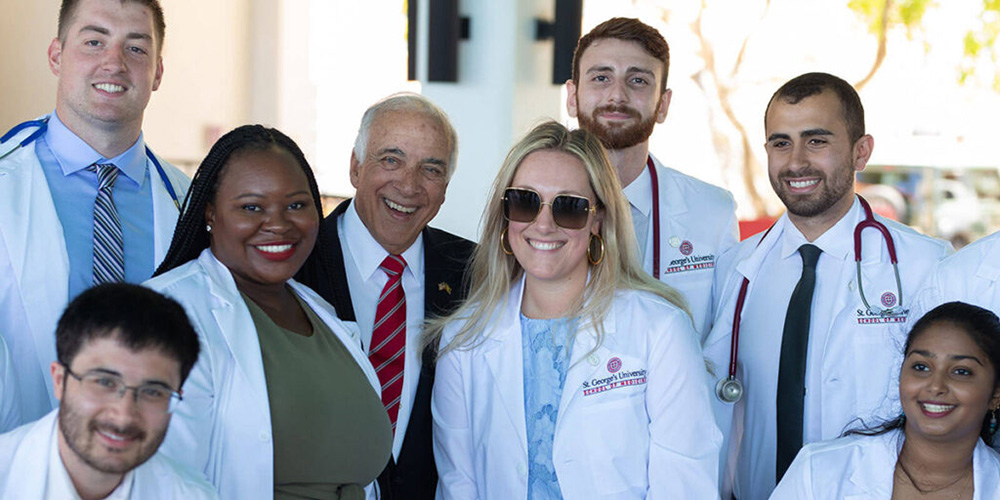The process of applying to medical school is rigorous. But the hardest work often begins once you’re a med student working your way through the in-depth curriculum and hands-on training required to become a physician.
In many cases, aspiring doctors pursue MD programs in locations away from home, which can leave them feeling isolated. Although you’ll be removed from your at-home support system of family members and loved ones, a high-quality medical school will be equipped with institutional resources and avenues for peer support that can help you learn to thrive in your new environment.
Join us as we explore the importance of having a strong support system in medical school and learn more about the resources to look out for.
Support for medical students: A critical component for success
It’s common for incoming med students to become a bit shell-shocked by the intensity of a quality MD program. For some, the fast pace and high academic expectations of attending medical school can lead to mental exhaustion and even burnout.
A report from the National Institutes of Health (NIH) notes that feelings of inadequacy, anxiety, and social isolation can impact most medical students; however not all MD students are equally equipped to overcome these challenges without support. The findings of one recent NIH study revealed that half of all students who don’t finish med school left their programs in the first year, which is why it’s critically important to get connected with a strong support system early in your medical school journey.
Every med school program will have its own methods for offering support to medical students, so it’s helpful to do some research on the student support services as you’re evaluating med schools. Two primary components of a strong medical school support system that you should look for are institutional support and peer support.
Institutional support for medical school students
Earning an MD is one of the most rigorous educational paths out there — it’s normal to struggle with the transition. In fact, high-quality medical schools fully anticipate that their students will need some help along the way.
One of the most prominent pieces of medical school advice you’ll hear is to never hesitate in asking for help. As a med student, you can certainly expect to rely on your academic advisor and faculty for guidance.
In addition, you’ll want to take full advantage of the suite of student support services offered at your medical school. This will often include things like non-academic advising, tutoring, and career counseling.
The specifics will vary from institution to institution, so be sure to determine which services are priorities for you and ensure your target programs offer the resources you’ll need. At St. George’s University (SGU), for example, medical students have access to a range of student support services, including:
- Health and psychological services
- Academic advising
- Non-academic advising
- Student accessibility and accommodation services
- Career guidance and student development
- Language services
- Mentoring
- Tutoring
- Residency/Match strategies
- Specialized coaching
All faculty members at SGU hold regular office hours to support students throughout each week. There are even “themed” office hours and faculty-led small groups during which faculty will focus on a specific topic to help students better understand the material — this can take on the form of question-and-answer sessions, anatomy labs, practical sessions involving standardized patients, and more.
Regardless of which student support services are most important to you, one of the most effective ways to prepare for the challenges you’ll face in any medical school that offers a variety of institutional resources to help guide you throughout your education.
Peer support in medical school
From the outside, medical school can seem like a very competitive environment, but many physicians look back fondly on the ways they were able to lean on their classmates for support. Students often bond over the shared experiences and struggles, building a strong camaraderie that creates another level of support.
This support is one of the factors that students appreciate most about the MD program at SGU. Studying at an international school means nearly every student is removed from their comfort zone and must lean on one another to find support.
“Your classmates become your family,” says Dr. Phillip Manners, 2011 SGU graduate. “You forge close friendships by going through it together, and I don’t think you would develop those types of bonds and relationships in a US or UK medical school setting.”
Peer support is always an option available to you as a med student, but some schools make it easier than others to provide opportunities for students to connect with and learn from others in the program. At SGU, for example, there are more than 100 peer learning groups each week in which upper-term students lead group reviews on a range of different topics. There are also several options available for one-on-one peer tutoring and peer counseling.
Supportive student-to-student interactions can go a long way in not only helping you master the curriculum, but also providing you with a sense of belonging as a medical student — and creating connections that you can carry forward into your career.
Feel supported as a med student
Even the most academically qualified students will face challenges if they don’t have access to an adequate support system in medical school. From the encouragement of cohorts to the resources at your institution, it’s critical to tap into every avenue available to you as you encounter challenges in your MD program.
For more information on the ways St. George’s University extends guidance and support to its medical students, check out our article “10 Student Support Services You Didn’t Know SGU Offered.”

